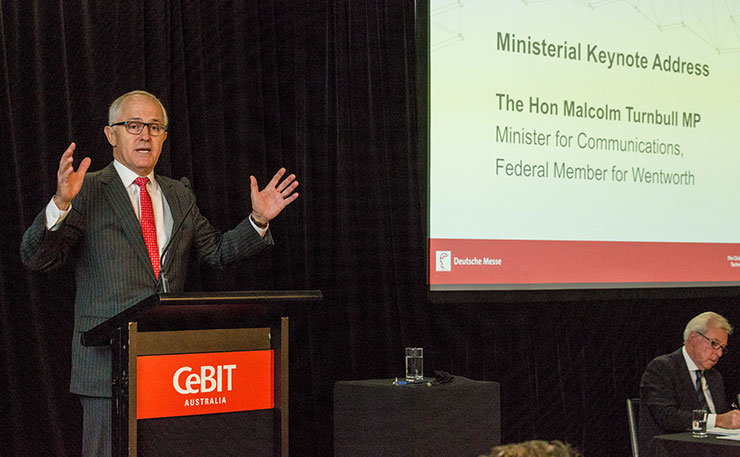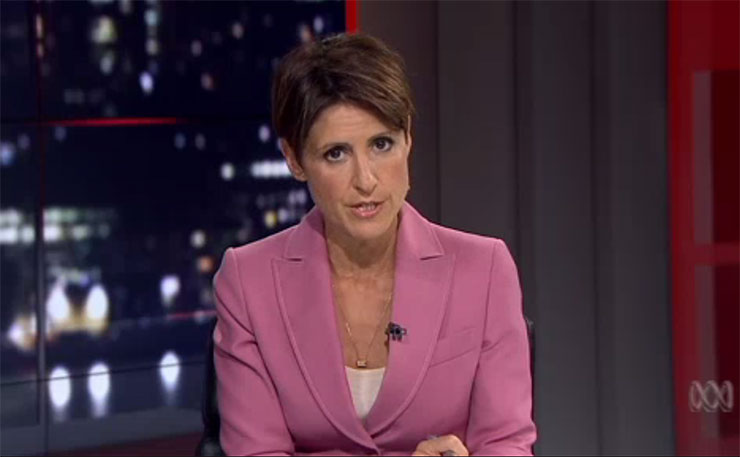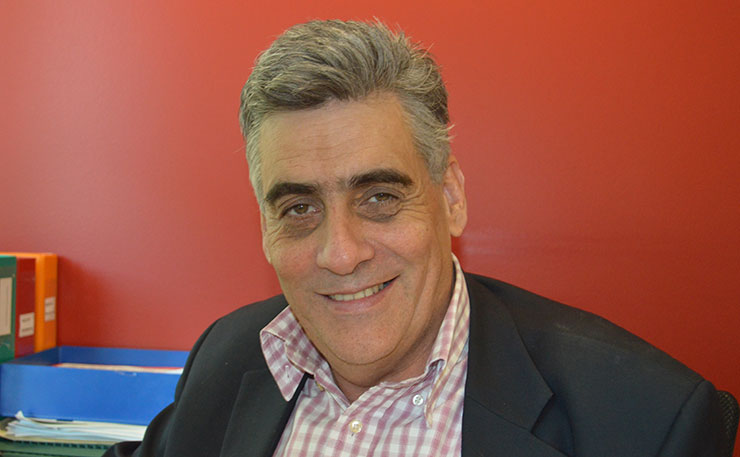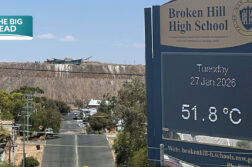This is the first in a series of articles from New Matilda about Tech journo Nick Ross and the ABC’s NBN coverage.
In the lead up to the 2013 federal election, amid a fierce political debate between the major parties over the roll out of the National Broadband Network, an ABC editor-journalist was directed by his boss to find any story he could that was critical of the Labor Party’s NBN Plan in order to provide “insurance” against attacks on the ABC by the Coalition.
The explosive revelations are contained in a secretly-made recording of a meeting between Nick Ross, the ABC’s former Games and Technology Editor, and Bruce Belsham, the Head of ABC’s Current Affairs division.
Ross has been the subject of growing media interest over the past week, following his resignation from the ABC on January 14. It came amid long-running speculation that Ross had been ‘gagged’ by the national broadcaster from reporting on the NBN.
That claim – that Ross was ‘gagged’ – continues to be strongly denied by the ABC. (See statement at the bottom of this story).
On May 28, 2013, Ross recorded a meeting with Belsham in which the two discussed an unpublished article Ross had written about the Liberal Party’s NBN policy. The article was critical of the Coalition’s NBN Plan, in particular the Coalition’s plan for a fibre-to-the-node broadband network that would rely on decades-old copper telecommunications infrastructure.

In the tape, obtained by New Matilda, Belsham repeatedly states that he’s under “internal and external” political pressure over Ross’ coverage of the NBN, and explains that despite “having no problems” with the specific story, he (Belsham) can’t publish it because “the Turnbull camp and my superiors will come down on me like a tonne of bricks”.
Belsham – a former Executive Producer of ABC’s flagship Four Corner’s program – suggests the story can only be published after Ross first writes a piece which attacks Labor’s record on the NBN. At the time, Labor was committed to building a fibre-to-the-premises (FTTP) broadband network, using superior – but supposedly more expensive – fibre optic cabling.
The meeting opens with this comment from Belsham: “Just in terms about the latest piece (which is critical of the Coalition plan), I don’t have anything per se in terms of objections to the piece, but… what I would suggest, to give yourself a bit of capacity to be able to do a few more of these, is to, to just turn the vision around a bit and just find some element of the, you know, of the Labor plan, of the NBN plan, which is up for debate, because I mean, and purely focus on that.”
In the recording of the meeting, Belsham states: “We’ve got to give you some kind of insurance policy, you know. An insurance policy is an article where you are hard-headed about something to do with [Labor’s] NBN failings, or, you know, potential failings. One of the quite basic failures is it’s not going to happen.”
He also states: “I like the [latest]piece, and I would like to publish it. But I’m just saying, before I can let you do that, so I don’t have screams from the 14th floor… we need to give ourselves [some insurance]and say ‘Look, this guy is prepared to be critical of some aspects of [Labor’s Plan], he’s written this tough article about X.
“[It could be] about [Labor’s] marketing [of it’s NBN Plan]… I’ll just leave that ball in your court. That doesn’t have to be the angle.”
Belsham’s logic – that Labor’s NBN Plan is “not going to happen” – appears to be based on his belief that “there’s a 90 per cent chance of a change of government” at the 2013 federal election. If that happens, Belsham argues, “the NBN will not be delivered in a way that Labor has promised”.
Belsham also re-iterates: “… this conversation is for this room only, but for a variety of reasons (all of them centred around Ross’ critical reporting of the Coalition NBN policy)… we’ve got a problem. And before I can unleash another two or three, or let you unleash another two or three things that are critical of the Coalition’s plan, we need, you know, we need some insurance.”
In the course of the 25-minute meeting, Belsham adds: “I think something of that kind means that you can then go on and [publish the story on copper cabling]and [another story Ross has written which is being held back], and we’re on comfortable ground, right. And it gives me a huge amount of, to be able to go and say to people externally and internally, ‘Look, you know, Nick’s written this tough piece on the roll out…’ or whatever it might be.”
Ross replies, “Okay” before Belsham adds: “Realpolitik, I’m not talking morality here, I’m talking about realpolitik.”
One of the more interesting exchanges in the meeting – and the one most likely to incite fury in the tech community – is when Belsham delivers his own views on the NBN.
BB: … I do think that for a range of reasons, that plan, [Labor’s] NBN plan, is not going to be the one the country gets.
NR: Well only if everyone was uninformed about it, I would have thought.
BB: No, well that’s, that may or may not be the case. But in the end the NBN and the NBN company will be a failure, however you categorise it.
NR: I couldn’t disagree more.
BB Oh, It will be a failure.
NR: How?
BB: It will be a failure, because it won’t be delivered and that’s a marketing and political failure.
Head of the ABC’s Current Affairs division, Bruce Belsham. (IMAGE: Courtesy of Mumbrella).
New Matilda contacted Bruce Belsham this afternoon seeking comment for this story. Mr Belsham initially emphatically denied all of the imputations put to him by New Matilda based on the audio recordings, dismissing them as “fanciful”.
He warned that the allegations were “on thin ice”. When New Matilda informed Mr Belsham that the allegations being put to him had been recorded on tape, Mr Belsham replied: “I don’t believe you.”
In a lengthy phone interview, Mr Belsham subsequently told New Matilda: “My recollection of those conversations, which were private professional conversations, were that I was concerned about Nick’s capacity to keep reporting, both from a personal point of view and a professional point of view, to keep on reporting on this material, and on this issue, and that there were obligations underneath the ABC editorial policies to make sure that all sides of the argument were covered.
“I also felt that there [was a need for]greater scrutiny of the Labor Plan, which I felt that we needed to cover in the interests of balance and accuracy.”
The audio of the Belsham-Ross meeting reveals that while Belsham did acknowledge he was not across all the detail of the NBN, and he suggested any story critical of Labor would suffice, Belsham also late in the meeting expressed the view there was room for additional reporting.
Belsham told Ross: “Look I understand that it’s not entirely fair. But I do think from where I sit that you do have this not entirely journalistic view that [Labor’s] NBN has many massive benefits, [and]that you can’t turn around and put it under the kind of forensic and scrupulous microscope that you’ve done to parts of the Coalition plan.
“And I do think that if you did that exercise in the same way you’re doing the Coalition plan, you’ll find stuff that needs to be talked about and needs to be commented on.”
In Nick Ross’ he points to a story he published a full year before the controversy which savages Labor’s handling of the NBN with a story headlined ‘The Great NBN Fail’. Notwithstanding this, Ross does file a story two months after his meeting with Belsham, which once again criticizes Labor’s marketing of the NBN. It includes a section headlined ‘Coalition’s Plus Point’, and praises the Coalition for targeting areas in the rollout with the worst broadband.
The ABC was also contacted for comment. Their unedited statement to New Matilda is published at the bottom of this story.
The background – the politics
The political background to this story is of course the fierce battle over the future of Australia’s largest infrastructure project – the National Broadband Network, one of the major election policy differences between the Coalition and Labor.
First conceived by Labor before the 2007 election, the NBN has been controversial since its inception.
In government, Labor committed to building a fibre optic network all the way to most Australian homes and business. Fibre optic cable would be laid to 93 per cent of Australian premises, at a capital cost that Labor eventually pinned at $37 billion. It became a major plank in Julia Gillard’s 2010 re-election strategy – and a key reason for the decision of independents Rob Oakeshott and Tony Windsor to back Gillard in minority government in August 2010.
Before the 2013 election, Malcolm Turnbull and Tony Abbott promised an NBN from the Coalition: one that was “cheaper” and would be delivered “faster.” The Coalition promised to roll out 25Mbs broadband by 2016, and for less than Labor had budgeted to spend.
On taking office, the Abbott government and its Communications Minister, Malcolm Turnbull, sacked the board of the NBN Company and appointed a new board and CEO.

Under the Coalition, the NBN is being built as a so-called “multi-technology mix”, in which broadband will be delivered by a mix of existing copper from fibre-linked street cabinets, existing fibre such as Foxtel and Optus’ HFC cables, and some of Labor’s already-completed fibre-to-the-home.
The ABC would of course have to cover the NBN, as it would any important government project. But the role of the public broadcaster in covering national political debate has always been controversial. The election of the Abbott government saw renewed pressure on the ABC for its programming decisions – most notably to allow convicted threat-maker Zaky Mallah to ask a question from the audience during an episode of QandA. The controversy led to a government boycott of the show and a review of the program’s content by the ABC Board, and the show was subsequently moved to the News division of the ABC. Malcolm Turnbull was Communications Minister during this period.
As minister, Turnbull also presided over the Abbott government’s funding cuts to the ABC in the 2014 budget. In November that year, Turnbull announced that the ABC’s budget would be cut by $254 million over the next five years to 2019 – a cut of approximately 5 per cent. As a result, the ABC made more than 230 staff redundant.
The background – the ABC’s coverage of NBN
Nick Ross says he wrote extensively on the NBN over several years without attracting controversy. But in February 2013, all that changed.
Ross published an article on the ABC’s Technology and Gaming portal – entitled “The vast differences between the NBN and the Coalition’s alternative” – which sparked an instant political storm which he says intensified after his story was picked up by the popular Channel 10 program, The Project.
The piece – which ran to more than 10,000 words and contained more than 100 links to external sources – savaged the Coalition’s NBN Plans, and stated unequivocally that the Labor NBN Plan was superior.
Ross wrote: “In just about every case the Coalition’s alternative compares unfavourably to the current plans – and usually in dramatic fashion. That’s based upon the facts and the information currently available in the public domain.”
The story drew swift condemnation from Malcolm Turnbull, who took to Twitter to accuse Ross of “bias”. It wasn’t the first time the two had clashed – in the preceding months, Turnbull and Ross had clashed during a Q&A at a technology conference, and on social media Turnbull had repeatedly accused Ross of biased reporting on the Coalition’s NBN plan, including claims Ross was promoting “relentless NBN propaganda” that was “an embarrassment to the ABC”.
Conservative commentators joined the attack on Ross – in particular Kevin Morgan in The Australian, and Grahame Lynch in Commsday (both stories are behind paywalls), who alleged serious bias and misreporting. But the piece also enjoyed substantial support in the ‘tech press’ – in particular on site Delimiter.
Reflecting on the article, and criticisms of Ross, Delimiter editor Renai LeMay subsequently told ABC Media Watch: “Virtually alone, out of all of Australia’s technology journalists, Ross has had the courage and the conviction to seriously and in detail investigate the often dubious claims which the Coalition has made….”
Even so, in the days after the story was published, Ross was summoned to a meeting with Belsham.
In that first meeting, Ross says Belsham warned him that the Coalition would likely win government later that year, and that Malcolm Turnbull – the then opposition spokesperson on Communications – would likely become their boss.
In documents obtained by New Matilda, Ross claims he was “told repeatedly by Bruce Belsham in May 2013 – four months before the election – that the ‘NBN was dead’ and that he (Belsham) wasn’t going to publish anything that would upset Malcolm Turnbull’s office when it would only create grief”.
Ross met twice more with Belsham – each time to discuss stories he had put up on the NBN. The final meeting occurred in May 2013, to discuss the story Ross had prepared which critically analyzed the Coalition’s plan to use copper wire, rather than optical fibre.
That meeting – which lasted half an hour – is the one secretly taped by Ross.
Ross never ‘disciplined for bias’
The fall out from the ‘Nick Ross Opus’ – as the lengthy piece published in February 2013 came to be known – was substantial and long-lasting.
The day after Ross published, The Australian ran a story on page 3, headlined ‘ABC disciplines NBN blogger’. The story was false – Nick Ross was never disciplined by the ABC in the course of his employment, nor did he ever face accusations from ABC management that his reporting was biased.
The headline on the story was changed by The Australian the day it was published to ‘Journalist Nick Ross reminded that his work must be “in keeping with ABC policies”’.
But Ross says he was never permitted to publicly respond to the false accusation – instead ABC management instructed Ross to say nothing, and advised him that the “news cycle would pass” and that the story would blow over.

But it never did. As recently as last week, The Australian was still falsely reporting Ross had been disciplined for bias, despite correcting its earlier report.
Ross submitted to a seven-hour interview with New Matilda earlier this week, conducted by three of the authors of this story – Ben Eltham, Chris Graham and Thom Mitchell.
He maintains that he did nothing wrong in his reporting on the NBN, and says to this day he continues to be falsely accused of bias.
“I’d be reading stuff like Lifehacker articles about something I’d done, like on the copper article, and someone in the comments section would say, ‘Oh yeah, but don’t forget what they said (in the media), he’s biased….
“That’s a big deal. I’m not biased.”
“My articles are scientific and they constantly challenge people to say have I said anything wrong.
“I’ve been really upset about being implicated in a conspiracy, which has worried me because it’s [had to]come out at some point, and that’s incredibly stressful.
Ross says it didn’t go unnoticed in the tech industry that after extensive coverage of the NBN, prior to the 2013 election, his reportage suddenly stopped.
Ross says that as the furore unfolded, colleagues at the ABC turned their back on him.
“When a story appears in the newspaper about you, like The Australian, where the only thing correct is your name and you’re not allowed to reply… people believe it and that is so frustrating.
“I never got to say (publicly) to anyone [that it was wrong].
“I went from doing several TV and radio [appearances]a week to several a year. I was just kind of dropped by everyone.
“I wasn’t approached to have anything to do with the NBN policy [within the ABC’s federal election guide]. It’s like I wasn’t trusted to do it….
“I couldn’t do my job any more, everyone thought the worst of me, I had no right of reply, and was completely thrown under the bus.”
Ross leaves the ABC
Ross spent the following two and a half years at the ABC maintaining a public silence on the false claims he had been disciplined for bias. And then last week, Ross finally resigned from the national broadcaster.
That same day – January 14 – Ross reached out to his 18,000 Twitter followers.

The Twittersphere lit up, and by noon the following day, Ross was the focus of an ‘Ask Me Anything’ session on online forum, Reddit, where users get to – as the name implies – ask Ross anything.
The session attracted hundreds of comments, which appear to be overwhelmingly supportive of Ross. While Ross’ appearance sparked interest across mainstream media outlets, he says no ABC outlet anywhere in the country covered the breaking story.
A New Matilda search also failed to find any ABC outlet which reported the story. Instead, the ABC issued a simple statement denying the allegations that Ross had been “gagged” (see at the bottom of this story).
But the Reddit forum was having none of it. Discussion during Ross’ AMA turned to other ABC journalists who wrote stories on the NBN, but who tech industry insiders and enthusiasts claimed were also “gagged”.
Emma Alberici denies her NBN coverage was delayed
One of those was Emma Alberici, a veteran journalist and one of the ABC’s most respected figures. In the shadow of the 2013 federal election, Alberici also prepared to weigh in on the national debate around the use of copper to roll out a National Broadband Network.
Like Ross’ coverage, the story – Can the Coalition’s NBN keep pace with change? -was also critical of the Coalition’s copper plan, suggesting that it was unlikely to meet the growing internet needs of the nation.
But the story – which Alberici appears to have started researching in early August – wasn’t published until September 9, two days after the Coalition swept to power in the federal election.
A brief email exchange between Ross and Alberici several days before the 2013 election – a copy of which has been obtained by New Matilda – suggests that Alberici was expecting the article to run before polling day. The correspondence is sparked by a Tweet Ross sent out on September 4, 2013 (the time stamp on the tweet is US time).
Keep an eye out for @albericie ‘s #NBN article on TheDrum this arvo. I passed her some of my potential articles – perhaps rubbed off? — Nick Ross (@NickRossTech) September 5, 2013
Alberici replied shortly before midday the following day.
Hi Nick, I appreciated your twitter plug but I didn’t appreciate the assumption that you influenced by (sic) writing. I haven’t read any of your material. The information about the cost of the Telstra maintenance is something I raised with Malcolm in our debate and it is a widely known fact. I have been working on this piece for more than four weeks which has involved assiduous research. I would appreciate clarification on Twitter that we have in no way collaborated.
Ross replied: “OK sorry. Won’t do that again.”
It drew this reply from Alberici a short time later: “Apologies for the terse nature of my message. My piece is now not running til next week. We didn’t really want anyone to have a heads up.”
New Matilda sought comment from Ms Alberici about why her story was delayed. She sent the following email reply:

“As an ABC journalist I’ve always taken very seriously my responsibility to report fairly, accurately and without bias. It’s not my role to campaign or publicly cheer for one issue or another. That is a fundamental requirement and clearly outlined in the ABC’s Editorial Policies. Equally, I have an inquiring mind and dived in to this issue after what I thought were some curious comments during a pre-election NBN debate. I’ve answered your questions below.
“The piece was written and completed Thursday and fact checked on Friday. Fact checkers at The Drum came back to me a few times to check on my sources which were predominantly in the US. They’re meticulous about substantiating all our comments.
“There was no specific publication date in mind. It was conceived after the Lateline debate I’d hosted the week before between Malcolm Turnbull and Anthony Albanese – see here.”
Ms Alberici stated she was not pressured at all about her reporting on the NBN, and that there was “no substance” to the claim she had also been “gagged”.
The end for Nick Ross
In the end, the final story Nick Ross wrote on the NBN was his July 1, 2014 ‘beat-up’ on the ALP. He says he never weighed in on the issue for the ABC again.
Instead, Ross negotiated to work from home, lessening the time he had to spend facing his colleagues at Ultimo in Sydney. He spent the next few years with his head down and restricted himself to editing the Technology and Gaming portal; commissioning other writers to weigh in on various issues; filing the occasional piece himself, but assiduously avoiding anything on the NBN.
With one exception.
Ross’ piece criticizing the use of copper in the National Broadband Network – the piece he sought to have published six months before the 2013 federal election, which led to his controversial meeting with Belsham – did, eventually, get published.
It was released on September 19, ten days after Emma Alberici’s article criticising the copper network finally ran, and almost two weeks after the federal election, which swept the Coalition to victory.
The ABC response
New Matilda sought comment about this article from the ABC.
The ABC replied this afternoon. In an email, a spokesperson for the ABC responded:
The ABC finds it unethical and reprehensible in the extreme that New Matilda expects a response to partial excerpts of secretly recorded conversations without the opportunity to hear and understand the full context of what was said, despite our repeated requests. These things can and will be interpreted to suit people’s agenda.
The personal counselling given to Mr Ross by his manager was extensive and delivered at length over a number of conversations. At times, those exchanges used unguarded and informal language, as is commonplace in private conversations that are intended to air issues fully, frankly, robustly and in confidence. It would be a shame if all such conversations had to be conducted as if they were on the record interviews. Nevertheless, the thrust of the sentiments expressed to Mr Ross in all of the discussions held with him were consistently that, as with all other topics, coverage of the NBN issue required adherence to the ABC charter and editorial policies, which require appropriately reflecting all major points of view.
To put the taped conversation into context: It followed Mr Ross as ABC Technology Editor publishing an almost 11,000 word article severely criticising the then Opposition’s policy on the NBN. To require him to next look at the current policy of the then Government in power is hardly unreasonable. In fact, it was the editorially responsible thing to do.
As previously stated, the notion that Nick Ross has ever been “gagged” by anyone at the ABC is nonsense. The ABC does not “gag” the coverage of any issues or topics of public importance. As our record makes clear, the ABC covers all issues of public importance thoroughly and independently. The only “restrictions” on the issues the ABC covers and the way we cover them are our Editorial Policies, which set standards for things such as accuracy, impartiality and fair dealing. All of our journalism is required to adhere to these standards at all times.
NEW MATILDA RESPONSE: In light of the ABC’s denial of the central claims in this story, New Matilda has begun preparing the complete transcript of the Ross-Belsham meeting for publication. Readers can, in the words of many ABC greats, make their own minds up. We’ll aim to publish the lengthy transcript before Sunday evening.
New Matilda also received a response from Alan Sunderland, ABC Director Editorial Policies, in relation to a specific inquiry from New Matilda that ABC journalists are operating in a climate of fear, and that the organisation has built a culture of ‘false balance’ in order to be able to manage the political attacks on the ABC.
Sunderland replied in an email:
The ABC’s charter and editorial policies commit us to fair, accurate and impartial reporting of all issues and that is what we aim for every day on every issue. In pursuit of that standard, there are regular conversations, meetings and discussions involving journalists, producers and news managers, as there are in any major news operation. Those conversations focus on the right issues to cover and the right way to cover them to ensure adherence with our policies. In relation to significant, controversial or contentious issues, attention is given to ensuring the coverage is fair, accurate and impartial. This can include ensuring that all issues consistently receive appropriate scrutiny and coverage, but it doesn’t involve “false balance” or giving all sides in a discussion the same weight. The policies we live by specifically make that clear. It is in no way controversial or surprising, for example, to expect that the policies of both sides of politics will receive the same scrutiny. But once that scrutiny is applied, the resulting coverage will be balanced according to the weight of evidence. This is not false balance – this is good journalism.
These are the standards we have put in place and these are the standards we are judged by. We regularly review our coverage as well as commissioning independent external reviews.
Note to readers
New Matilda is a small, independent media outlet. Our resources are extremely limited – we operate on the sniff of an oily rag, and the majority of our staff, writers and contributors are unpaid.
If you want to help support this kind of independent reporting you can subscribe to New Matilda here, or contribute smaller amounts to our latest Pozible fundraising campaign, launched to try and secure a contributor’s budget for the first quarter of 2016. It’s worth noting, this story came to New Matilda as a result of the work of Ben Eltham. Ben is a contributor to New Matilda, and earns a literal pittance for his writing.
The is the first in a series of articles by New Matilda about Nick Ross and the ABC’s NBN coverage.
New Matilda tweets here. Ben Eltham tweets here. Chris Graham tweets here. Thom Mitchell tweets here. Wendy Bacon tweets here.
Donate To New Matilda
New Matilda is a small, independent media outlet. We survive through reader contributions, and never losing a lawsuit. If you got something from this article, giving something back helps us to continue speaking truth to power. Every little bit counts.






